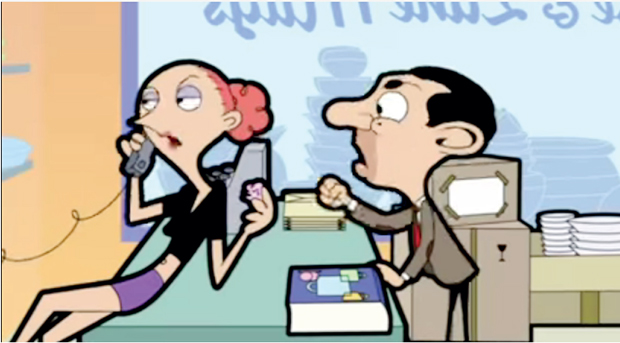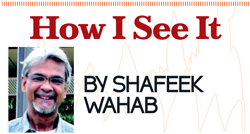Reply To:
Name - Reply Comment

 Wedding functions, year-end corporate events, Christmas parties and New Year’s Eve dances are all over. December’s monthly revenue was high as the hoteliers bid adieu to last year, exclaiming ‘All’s well that ends well’. Soon that euphoric feeling will ebb as the challenges in the coming year unfold. That’s when it’s time to regroup and retrain your staff.
Wedding functions, year-end corporate events, Christmas parties and New Year’s Eve dances are all over. December’s monthly revenue was high as the hoteliers bid adieu to last year, exclaiming ‘All’s well that ends well’. Soon that euphoric feeling will ebb as the challenges in the coming year unfold. That’s when it’s time to regroup and retrain your staff.
If you think your banquet sales executive or coordinator (or whatever you call him/her), is promoting your function rooms, upselling menu options and recommending value-added features - think again. These people are paid the minimum wage and unless you invest time and professional training for them, you will get the minimum results from them. The key to getting and keeping good service people is to recognise them as sales people hired to do a professional job. Treat it as the number one job requirement.
Otherwise, you will never have professionals selling your product. Instead, you will have disengaged employees carrying out the job in a perfunctory manner. International brand hotels such as Grand Hyatt, Shangri-La, Sheraton, ITC and others will soon commence operations in Colombo. Now is the time to separate the order takers from the sales professionals in your banquet department. Unless you do that…be prepared to settle for the crumbs on the table!
Four five-star city hotels
Around early January this year, my wife and I visited four five-star city hotels to select a suitable hall for a private event to be held on a Monday, later this year.
For starters, booking a venue for a function is not the same as reserving a room for an overnight stay. With today’s technology, one can reserve a hotel room with a few clicks – a clear indication that the hospitality industry is slowly but surely moving towards a ‘technology-based self-service’ gateway, to replace the traditional ‘human touch’ (or ‘voice’ in the case of room reservations) services.
Booking a hall for a function however, is a bit more complicated. There is the hassle of making several visits and follow-up calls before the deal is closed. The dividend to a hotel that has large function rooms to sell is that a single ‘walk-in’ potential customer can book business in excess of Rs.2 million, for one event, for just one night. On the contrary, the hotel will need to sell anything between 75 to 100 hotel guestrooms to derive that kind of revenue.
First impressions bruised
The ‘Customer journey’ usually begins with driving into the car park and the walk to the hotel entrance. Parking at the hotels visited, was not a problem - except at this one particular property located opposite the old House of Representatives, where good intentions can lead to bad inventions.
I was stopped by the guard at the barrier to the car-park and asked in an accusatory manner “where are you going?” My reply “to the car-park” was challenged with another question – “going to the hotel?” And when I nodded, he grimly asked me my name, before dismissively waving me past.
One interesting shift in hotels is the ‘outsourcing’ of security and other services. While potentially advantageous to a hotel’s immediate bottom line, the result can be disastrous from a long-term guest loyalty and profitability point of view. If an outside source is not seamlessly integrated in the hotel service promise, relationships can turn sour. When the first impressions get bruised, hotel staff will need to work harder to get guests back on-board and in the flow of a good experience.
‘No man’s land’
As a prospective customer, the moment I walk through your door, I will be discovering many aspects of your business. Staff in the banquet offices of all hotels visited was well dressed and presented a neat and professional appearance.
However, as a customer, I also want to hear words of greeting and see a smile when entering. None of this happened in any of the visits!
Those who looked up from their tiny cubicles simply gazed at us as if we had accidently stumbled into ‘no man’s land’. At one hotel, (Hotel X), three members of staff were talking together as we entered and stood hesitantly at the door. Giving us a cursory glance, they continued with their discussion, indeed a powerful demonstration of how to downplay or ignore the importance of
a customer!
Scripted monologue
All hotels barring one, met our initial enquiries with a scripted monologue; about what’s available and how the booking process worked. At every hotel we received an attractive banquet folder, inside which were several inserts laying out catering options, what’s included in the rate and what is extra. Prices too were clearly defined including the applicable surcharges (service charge and a plethora of government taxes). None of the inserts carried any terms and conditions.
Everyone we spoke to explained it verbally including what deposits are needed and by when. All of them said more or less the same thing, concluding with ‘once you confirm with us, we will tentatively hold your booking in our books for X number of days, within which time you need to pay the required advance deposit’. Incredibly, we were asked key information such as contact name and number only at one hotel.
Kill business
Excepting one hotel, where the person showing us around sounded confident in what he was telling us and dealt with the initial enquiry somewhat efficiently, the interactions at the other hotels were below par. There was this one coordinator who tried hard to impress, but, somehow managed to sound very condescending. All it did was, jog my memory about something I had read a while ago - where it is written that in one day Samson slew 1,000 enemies with the jawbone of an ass. This employee certainly had the same weapon to kill potential business.
Compensate for inadequacy
The hotel facing the green, offered us a venue that could only be reached by climbing a circular winding stairway. Upon pointing out that accessibility for the elderly and differently enabled people was non-existent, the hotel’s solution was to offer another venue that moved guests via elevators. But there was a price to pay. The hotel insisted that I increase my guest list by 50. This meant my having to fork out an additional Rs.250, 000 to compensate for this hotel’s inadequacy.
At another hotel we could not see the suggested venue as it was occupied on the day of our visit. Instead, we were shown some photographic images that depicted it as promising – which simply wasn’t the case, when we actually saw it on another day. It was a blotched makeover, of a low ceilinged restaurant with dirty A/C vents and a tired and badly stained carpet.
No thanking
None of the hotels’ staff thanked us for making the visit or for our enquiry. As for following up-that is another story. It was one-sided - all from my (customer) side.
Either the local banquet business is booming or it is something vehemently disliked by the hotel staff.
From my experience, one can conclude that most of the staff encountered is at best BMs. BM is the acronym for ‘bare minimum’ and BMs do just enough to not get noticed, pulled up, suspended or fired. BMs have no interest in exceeding expectations. For them barely meeting expectations is an achievement.
Worst experience
The award for ‘worst experience’ goes to Hotel X. After the ‘cursory glance’ type of welcome we received, we made our way to a coordinator, who, whilst remaining seated, signalled to us with a hand gesture to sit. Acknowledgement of our presence and invitation to sit were all done sans any acoustically conveyed sound patterns.
Having verified that a hall was free for our planned event date, he pulled out a set of menus. Using a calculator he furiously began writing down the net rates as we continued to sit in silence for the next two minutes or so. Placing the menus and a few more inserts (plain copy paper prints - unlike that of those in the other hotels), into a folder, he handed it over, saying “All the information is in there. My card is also attached. Call us within the next Y days and confirm. By the way, have you seen our ‘Count Court’?”
When I said that I have attended some functions held there, he merely nodded his head and replied, “Ah Okaay” – implying I guessed, that a show round was unnecessary. In all, we were in and out in less than five minutes.
Interestingly, at Hotel X, the rates for the same menu differed between Thu/Fri/Sat (more) and Sun/Mon/Tue/Wed (less). Although first off-the-blocks on the science of ‘yield management’, in the art of ‘selling’, it was the slowest on the track.
If I were to rate the hotels visited on my voyage of discovery, on a scale of ‘1 to 10’ where 10 = ‘very positive’ and 1 = ‘very negative’, three of the four hotels would hover between one and four. Only one hotel would make it to a five. Given that the menu rates at these four hotels ranged from Rs.5,600 to Rs.6,200 per person, it was disheartening that at none of these hotels could I identify a USP, or point of differentiation from the competition. To me they appeared to be competing in a commodity market.
As Sam Walton once said, “There is only one boss - The customer. And he can fire everybody in the company from the chairman on down, simply by spending his money somewhere else.”…And, that’s exactly what we did!
(Shafeek Wahab, a hospitality consultant, professional trainer and speaker, works with organisations that want to become more customer-centric by changing how they deal with customers and are passionate about enhancing their reputation. With an extensive background in hospitality management spanning over 30 years, he uses his experience and knowledge to provide assistance to clients who want to move beyond the limitations of traditional ‘best practices’. He can be contacted at [email protected]. Website: www.in2ition.biz)